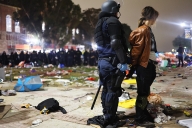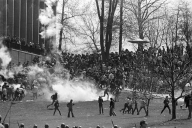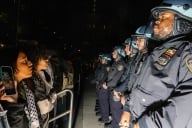You have /5 articles left.
Sign up for a free account or log in.
Witnessing an insurrection and attempted coup at the U.S. Capitol brought outrage, profound soul-searching and long-overdue reckonings to all believers in democracy. Questions of how we got here lead naturally to what we, as college and university leaders, must do to address the root causes and prevent such madness from ever recurring.
The temptation for higher education might be to look away from chaos that flies in the face of our values of nonviolence, reasoned debate, respect for evidence and truth, and honor for democratic institutions. Contrary to stereotypes already circulating on both ends of the political spectrum, the mob that descended on the seat of government included more than working-class whites whose resentment the president had stoked. Wednesday’s subversion was executed by a broad cross-section of the American public, including college-educated disciples of QAnon and alumni of many of our own institutions who believe they have been disenfranchised.
Higher education is distinctly positioned to form citizens and leaders who are able to discern truth in a digital age rife with disinformation, protect the principles of democracy in a deeply divided nation, make life choices informed by a crucial awareness of history, communicate persuasively through civil discourse and fight incessantly for justice in the face of racism and oppression.
And if institutions of higher education seek to restore the trust that has eroded among citizens of all political views, the question that every faculty member, dean, chief academic officer and president should be asking is this: How do we need to educate in order to help build up a bulwark against future assaults on American democracy?
Today, even more than a week ago, certain skills and realms of knowledge belong in every citizen’s intellectual tool kit. The five we propose here arise out of the traditions of liberal arts education but must be fashioned anew in response to the demands of information, media and political ecologies that have undergone staggering transformations in the space of a few decades. We do not seek to specify how any particular institution might reimagine its courses, degrees or departments, but if colleges and universities are to meet the challenges of this moment, we need to offer students at least the following.
Information literacy, including scientific literacy. This week’s insurrection was built on lies -- falsehoods about the presidential election that every judge and election official who considered them had debunked. As Georgia secretary of state Brad Raffensperger put it, “Mr. President, the challenge that you have is the data you have is wrong.”
And yet those falsehoods multiplied and circulated, often through media that simply didn’t exist when today’s curricula were designed. (We might say the same about the spread of false claims related to the pandemic, such as the efficacy of masks against the COVID virus.)
Social media and the internet as we know them today are among the most transformative inventions in the history of communication, but they come with few guardrails. We have to prepare students to sift discerningly through the reams of information at their fingertips, to interpret quantitative and qualitative data, to distinguish truthful from untruthful claims, and to understand how information makes its way to them and how the media shapes our national discourse.
Democracy and the rule of law. Not only did President Trump whip up the mob with falsehoods, but they were falsehoods easily debunked by even a rudimentary understanding of the institutions of U.S. democracy. It is simply not the case that the vice president can singlehandedly prohibit the certification of a state’s electoral votes.
Many students come to college woefully underinformed about the mechanisms of democracy; as the Center for American Progress has warned, less than 25 percent of high school graduates are proficient in civics. It is difficult to honor the rule of law without understanding its institutions, and colleges must prepare students to be citizens knowledgeable about the U.S. Constitution, the values it enshrines and the fragile means by which democracy functions.
United States history -- all of it. It is easy, as many members of Congress did in their remarks the day after the insurrection, to romanticize the Constitution and its framers. American exceptionalism, which has so often been couched in religious language, obscures this nation’s full and complex history.
This summer, for instance, many white Americans came to grips for the first time with the legacies of slavery, lynching, Jim Crow, mass incarceration and police violence with which our Black and brown sisters and brothers have lived, viscerally, for centuries. College and university curricula have hidden other forms of oppression and marginalization as well, whether the experience of immigrant laborers or that of the LGBTQ+ community.
If we expect our students to engage thoughtfully in conversations about the future of the nation, we have to teach them about the past in an unvarnished way. That includes unpacking why Capitol police and other law enforcement officers treated most of the insurgents with kid gloves, in striking contrast to the brutal treatment meted out to Black Lives Matter protesters over the summer.
Rhetoric. Throughout history, demagogues with the capacity to tap into the darkest features of human nature have gained unimaginable influence and power. The ability to persuade, to frame one’s ideas and arguments in ways that can shape minds and hearts, is value neutral -- it can serve good as well as evil ends.
Students not only need to be rhetoricians but equally to be shrewd consumers of rhetoric. Colleges can help form discerning citizens who recognize when others are trying to manipulate their emotions and warp their reasoning -- whether through incomplete or biased narratives about the past, fearmongering, intimidation or simply false claims regarding the facts.
Ethics and character. When the books finally close on the current administration, posterity will not be kind to those who abandoned their values in the pursuit of power. As Senator Mitt Romney asked Wednesday night, “Do we weigh our own political fortunes more heavily than we weigh the strength of our republic, the strength of our democracy and the cause of freedom? What is the weight of personal acclaim compared to the weight of conscience?”
Fundamental to the project of college is to help students develop and live out their moral values and character. What constitutes the good life is a timeless question, and students need opportunities to explore and interrogate competing visions of what is good, what is just and what sources of meaning and values they will regard as important or ultimate. These conversations are all the more important in a moment when traditional sources of ethics, especially religious institutions, face crises of credibility that dwarf those facing higher education.
The coming transition in presidential administrations offers colleges and universities the opportunity to contribute to the rebuilding of American democracy, after four years in which truth, knowledge and expertise have come repeatedly under attack. This is not inherently a partisan project, although there will be, and ought to be, principled disagreements about the best tactics and strategies to pursue.
In the end, if higher education is to live up to our mission, our very reason for being, we have to ask what we did -- and what we failed to do -- that helped make possible the tragic events of Jan. 6.








